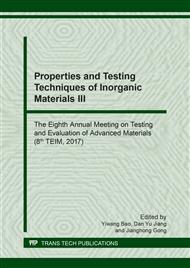p.102
p.109
p.114
p.119
p.129
p.135
p.140
p.146
p.152
Improved Repeatability of Oscillatory Rheological Measurements for Polycarbosilane Melt
Abstract:
Dynamic Time Sweep of Rotational Rheometer has been Used to Study the Variation in Rheological Properties of Polymers with Time. Polycarbosilane (PCS) is a Solid Oligomer at Room Temperature and Becomes Melt at its Softening Temperature. Bubbles are Unavoidably Produced by Gasification of Low Molecular Weight Part of PCS, which Significantly Disturbs the Subsequent Rheological Measurement. however, the Rheological Data of PCS Melt Cannot Be Repeated on Conventional Dynamic Time Sweep Test even after Reducing the Bubble. in this Work, a Series of Oscillatory Rheological Measurements were Carried out by Temperature Control to Improve the Data Reliability. the Axial Force Data of PCS Melt were Manually Recorded and Compared before and during the Test, which Reflected the Response of PCS Melt to Temperature Change. the Results Confirmed that the Shear Stress of PCS Melt was Readily Affected by Temperature Alteration. the Data Repeatability of the Rheological Test was Evidently Improved for PCS Melt with the Temperature Control.
Info:
Periodical:
Pages:
129-134
DOI:
Citation:
Online since:
April 2018
Authors:
Keywords:
Price:
Сopyright:
© 2018 Trans Tech Publications Ltd. All Rights Reserved
Share:
Citation:


